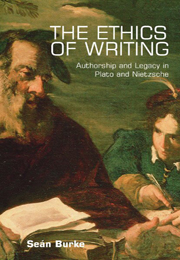Book contents
- Frontmatter
- Contents
- Acknowledgements
- Key to References and Abbreviations
- Prologue: Friedrich Nietzsche in Auschwitz, or the Posthumous Return of the Author
- Introduction: The Responsibilities of the Writer
- Chapter 1 The Ethical Opening
- Chapter 2 The Ethics of Legacy
- Chapter 3 Signature and Authorship in the Phaedrus
- Chapter 4 The Textual Estate: Nietzsche and Authorial Responsibility
- Conclusion: Creativity versus Containment: The Aesthetic Defence
- Bibliography
- Index
Prologue: Friedrich Nietzsche in Auschwitz, or the Posthumous Return of the Author
Published online by Cambridge University Press: 12 September 2012
- Frontmatter
- Contents
- Acknowledgements
- Key to References and Abbreviations
- Prologue: Friedrich Nietzsche in Auschwitz, or the Posthumous Return of the Author
- Introduction: The Responsibilities of the Writer
- Chapter 1 The Ethical Opening
- Chapter 2 The Ethics of Legacy
- Chapter 3 Signature and Authorship in the Phaedrus
- Chapter 4 The Textual Estate: Nietzsche and Authorial Responsibility
- Conclusion: Creativity versus Containment: The Aesthetic Defence
- Bibliography
- Index
Summary
And God had him die for a hundred years and then revived him and said:
‘How long have you been here?’
‘A day or part of a day,’ he answered.
(Koran, II, 261)We, too, associate with ‘people’; we, too, modestly don the dress in which (as which) others know us, respect us, look for us … But there are also other ways and tricks when it comes to associating with or passing among men … for example, as a ghost … One reaches out for us but gets no hold of us … Or we enter through a closed door. Or after all lights have been extinguished. Or after we have died. This is the last trick of the posthumous people par excellence … this whole subterranean, concealed, mute, undiscovered solitude that among us is called life but might just as well be called death – if only we did not know what will become of us, and that it is only after death that we shall enter our life and become alive, oh so very much alive, we ‘posthumous people’!
(Friedrich Nietzsche, The Gay Science, &365)Nietzsche's story ends as our narration begins. Wheelchair-bound, intermittently lucid, he is, as before, tremulous and peremptory. Cavernous, his eyes retain a rheumy dignity. The void into which he so long gazed would now seem to gaze into him.
- Type
- Chapter
- Information
- The Ethics of WritingAuthorship and Legacy in Plato and Nietzsche, pp. 1 - 18Publisher: Edinburgh University PressPrint publication year: 2008



